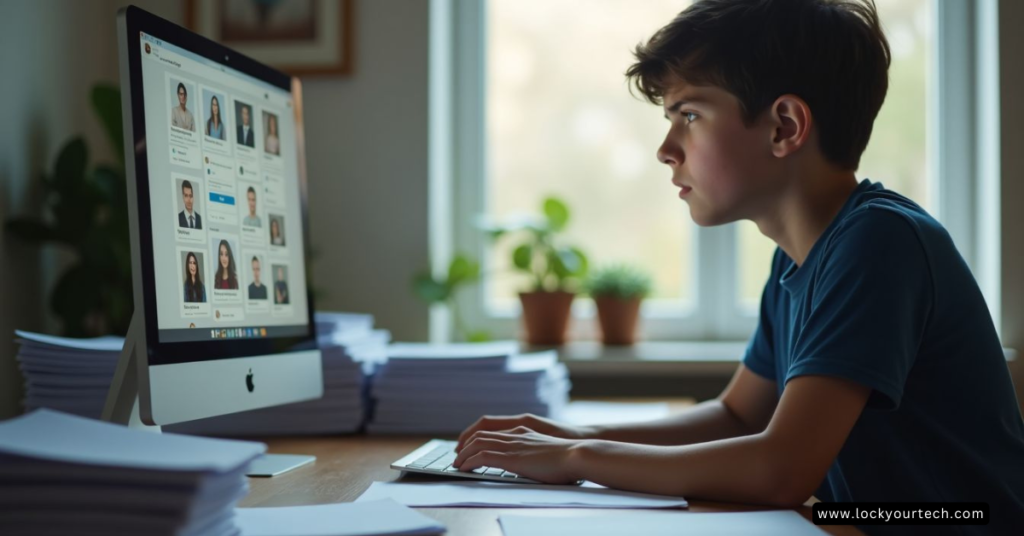Worried about privacy issues with social media? You’re not alone. These platforms collect a lot of personal data, and breaches seem to happen all the time. In this post, I’ll break down common privacy risks and share easy tips to help you stay safe online.
Keep reading—your privacy is important.
Key Takeaways
- Default ≠ Safe: Social media platforms’ default privacy settings typically favor data sharing over protection. Review and update yours regularly.
- Digital Footprint is Forever: Content you share today can impact future opportunities. Think twice before posting personal information.
- Cross-Platform Tracking: Social platforms track activity across multiple sites. Use privacy browsers and limit third-party permissions.
- 2FA is Non-Negotiable: Enable two-factor authentication on all accounts – it’s your strongest defense against unauthorized access.
- Regular Audits Matter: Monthly privacy checkups help catch unwanted changes to settings and remove unused third-party access.
- Location Sharing is Optional: Disable automatic location tracking in apps and only share when necessary for specific posts.
Common Privacy Concerns with Social Media
Social media platforms collect and store large amounts of personal data. This opens the door to risks like identity theft, scams, and unauthorized sharing.
Data mining and identity theft
Platforms collect profile details, location data, buying habits, and shared posts. Scammers use even small bits of this to steal identities. In 2018, the Cambridge Analytica scandal revealed misuse of data from 87 million Facebook users.
This breach showed how personal information can get exploited for targeted advertising or fraud.
Cybercriminals track what users share online. Basic details like phone numbers or birthdays help them access accounts or commit credit card theft. Third-party apps often gain too much access through weak privacy controls, risking sensitive data exposure without proper safeguards in place.
Privacy setting loopholes
Some social media privacy settings fail to protect sensitive data. For example, Facebook was fined $122 million in 2017 for misleading users about WhatsApp data sharing. Public profiles make personal information and posts easy to access by strangers or companies without direct consent.
I notice that many platforms collect more user data than needed, like GPS locations or browsing history. Even with “private” settings, shared content can still spread beyond intended audiences.
These gaps put users at risk of cybercrime and identity theft.
| Related: Internet Safety for Teens: Essential Tips to Stay Secure Online
Third-party data sharing
Companies often share data with third-party apps or advertisers. Meta was fined $1.3 billion in May 2023 for breaking EU privacy laws. These companies collect personal information like location and browsing habits.
Tracking cookies help them sell this data for targeted ads. In 2016, WhatsApp announced it would share user data with Facebook, raising privacy concerns.
Weak security in third-party platforms can expose sensitive information on social media users to cyberattacks or misuse. This includes names, credit card numbers, and email addresses.
Such actions violate data privacy and harm trust in social media networks like TikTok or Snapchat.
Social engineering and phishing scams
Hackers trick users into giving private information. In August 2019, a phishing attack targeted Instagram with fake login pages. These scams also steal social security numbers and passwords by posing as trusted sources on social media platforms.
The FTC reported $2.7 billion lost to online scams in 2021. Malware spreads through links or messages shared on many social media accounts. Phishing puts personal data at risk while harming account security and devices.
| Related: Top Ways to Protect Your Personal Information and Privacy

Effective Solutions to Address Privacy Issues
Take control of your online safety by using strong settings, sharing less personal data, and adding extra security steps. Keep reading to learn how to protect yourself online!
Strengthening privacy settings
I review my social media privacy settings regularly. This helps me control who can see my posts and personal data. I disable geolocation features to avoid sharing my location without consent.
Many platforms collect this data, but turning off GPS blocks it. Stronger settings give more control over what others access.
Stricter regulations push companies like Facebook to improve privacy policies. EPIC fought for better safeguards in 2014 after reports of emotional manipulation experiments surfaced.
The Federal Trade Commission’s action against abuses supports users’ right to online privacy without fear of mismanagement or spying.
Limiting personal information shared online
I check my social media profiles to remove personal details like phone numbers or addresses. Sharing too much can lead to doxxing or data breaches. Trolls and cybercriminals misuse such information for scams or harassment.
I avoid posting GPS locations or tagging places in real-time. Location data paired with other online activity builds a dangerous digital footprint. Reducing personal content limits risks on platforms like Facebook, Twitter, and LinkedIn.
Using multi-factor authentication
I enable multi-factor authentication to secure my social media accounts. It adds an extra layer of security by requiring two or more ways to verify identity, like a password and a text code.
Many platforms offer this feature, making accounts harder for hackers to access. Social media sites collect sensitive personal data, which increases the risk of breaches without strong safety measures.
In 2011, Facebook faced FTC charges for privacy issues. The Cambridge Analytica scandal in 2019 further exposed weak protections. Multi-factor authentication can protect against such risks by blocking unauthorized logins even if passwords are stolen.
I use it on all apps where personal information is stored or shared online.
| Related: Data Protection vs Data Privacy: Key Differences Explained
Conclusion
Privacy on social media is a big concern today. Issues like data breaches and scams affect many users. I handle this by sharing less personal information and using strong security tools, like multi-factor authentication.
These steps help protect sensitive data from misuse or theft. Everyone should focus on staying safe online while enjoying social platforms.
Remember: Your privacy isn’t just about keeping photos private anymore – it’s about protecting your entire digital identity. Ready to take control? Start with that privacy audit we talked about. Trust me, future you will be grateful!
FAQs
1. What are the common social media privacy issues?
Common issues include data collection without consent, sharing personal information publicly, cyberbullying, disinformation, and malicious activities like doxing or ransomware attacks.
2. How can users protect their privacy on social media?
Users can adjust security settings, avoid sharing sensitive personal information, use strong passwords, disable GPS location services, and review terms and conditions carefully.
3. Why do social media platforms collect user data?
Platforms collect data to build user profiles for targeted marketing, improve their business models, enhance content personalization, and sometimes sell data to third parties.
4. What is the impact of social media privacy concerns on mental health?
Privacy breaches or cyber threats such as spamming or trolling can lead to stress, anxiety, or other mental health challenges for users.
5. Are there laws protecting personal data on social media in the United States?
Yes. Laws like GDPR (General Data Protection Regulation) in the European Union influence global practices. In the U.S., regulations focus on specific areas but lack a unified approach compared to GDPR.
6. How can parents ensure safe usage of social media for children?
Parents should monitor accounts closely when children sign up for an account and educate them about risks like spyware or botnets while encouraging safe online behavior with secure apps.



